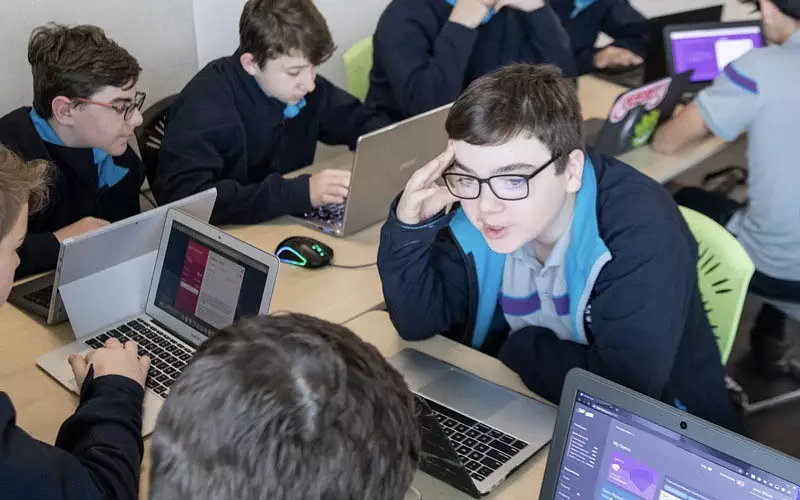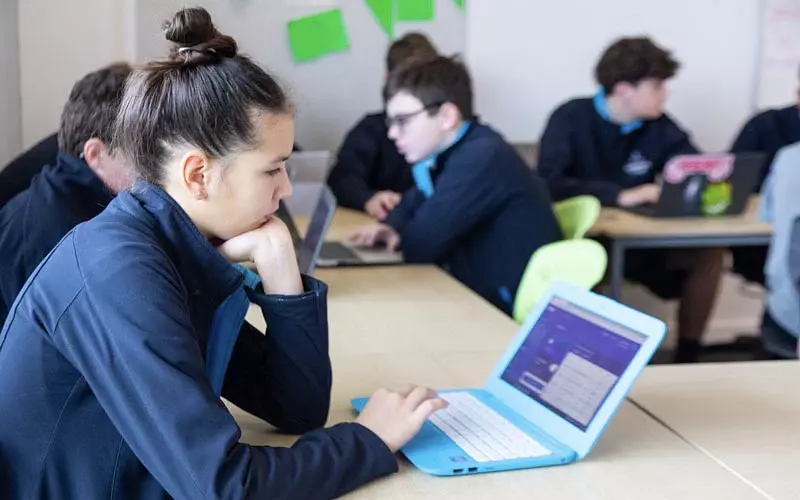Financial literacy as a priority
AJHS recognised the importance of financial literacy, and in 2020, moved it out of the optional Business Academy course and establishing a year-long compulsory programme at Year 10, sitting within Core Social Studies. The curriculum design was left up to the department, and consequently the approach changed as staff came and went. Prior to introducing Banqer, the school had been relying on a series of rather uninspiring workbooks. Both students and staff were keen to find an alternative more engaging approach.
“I was all set to rewrite the unit when I heard about Banqer,” recalls Kaye McKean Head of Learning Area, Social Studies and Business Academy, “I immediately recognised Banqer’s potential and shared the programme to the Senior Leadership Team. They were impressed, approved the funding and we launched it at the start of the academic year.”
Staff took to it like ‘ducks to water’
Prior to the students getting their hands on it, Kaye spent some time introducing the staff to the programme, “We took it slowly as some staff were daunted by the thought of relying on technology to deliver the unit. I got them to log on one week, used a staff meeting the following week to discuss the approach, then a week later the trainer from Banqer ran through it with them.”
Kaye was pleasantly surprised to find that the staff didn’t need much more support, “It really isn’t difficult to grasp. A number of the team are already using it better than me. One of my most reluctant team members has taken to it like a duck to water. She is using the award feature and actively dishing out gems!”

Click here, sign up and go
The Department divided the expansions up equally throughout the academic year, completing banking, careers, property and budgeting in the first half of the year. At the start of each expansion they have a ‘Banqer’ day and utilise one seventy-five minute period to introduce the new learning.
The students then complete each expansion in their own time. Some students use their whanau time to check in daily, whilst others do it at home. Kaye was impressed with how easy it was for the students to get going, “They use Google Classroom, so we popped in a link and told them to click here and sign up. It doesn’t seem to take them long to understand what each expansion requires and then they are off.”
Lessons in life
Kaye teaches two classes totalling almost fifty students and the learnings have been significant, “They were amazed at the rate of interest on credit cards, they have been taken aback by the impact random events can have on you financially, and they found tenancy rights fascinating.”
Banqer puts the students in real life situations. They are their own person and making their own decisions, and dealing with all the ramifications.
Student interaction with Banqer has also created a wealth of organic discussion, “Two students decided to enrol in every university course and ended up owing half a million in student loans. They were declared bankrupt and we had this wonderful discussion about what that means for a person.” Kaye also cites conversations around flatting and the implications of less than reliable housemates and in another case, the result a negative reference had on a student’s career options.
Joy and financial literacy
Kaye has been pleased with the response, “The students are so positive about it. Instead of dreading financial literacy, they really love what they are doing. There is such a sense of excitement and fun. Parents are even excited that their kids are excited.” Whilst teachers can make learning fun in many ways, Kaye sees this as being an easy tool to do just that, “It has created an element of joy in my classroom, and fun just makes life easier for everyone.”
Banqer provides many teachable moments, but also moments of real joy in the classroom.
Kaye identifies the competitive angle of Banqer as being key to the programme’s success, “Outside of sports you don’t really get competition in today’s school environment. They are so excited when we look at the rankings onscreen.” At the same time Kaye describes Banqer as being a real equalizer, “Some students who may struggle with other approaches are doing very well, whilst some students who verbally seem more able are not that high up the rankings, but this just motivates them more. They crave it and beg me to start the next expansion.”
Kaye chuckles, “The only problem is students accessing the app during other classes. One maths teacher has even asked me if the programme has the ability to financially fine the students, which it doesn’t. The Maths teacher has told them it does!”

Future-focused learning
The Social Studies teachers’ response has also been positive, appreciating the level of student engagement but also the ease of management. They particularly welcome the highly visual colour coding that shows how each student has performed, “This means that we can see issues immediately. We saw straight away that some students were struggling with compound interest. We identified that there was a gap in their mathematical knowledge rather than their understanding of the concept and speedily did some maths revision.”
Above all, for Kaye and her team, whilst Banqer gamifies the subject of financial literacy, it still prioritises the knowledge that students need to be able to successfully navigate these situations in real life, “Students are highly motivated to get all the questions right in the quizzes to avoid being financially penalized. In amongst all the gameplay, the focus is very much on the significant learnings that they need for their own futures.”
